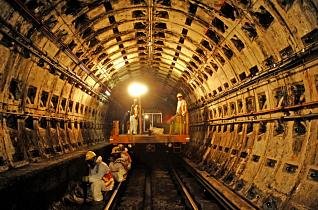Transit Workers Demand Meeting with TTC Over Subway Pollution
The TTC’s largest union is demanding an emergency meeting with transit agency officials after researchers discovered elevated levels of pollution in the subway system.
The leaders of Amalgamated Transit Union Local 113, which represents 11,000 TTC workers, say they’re concerned that employees are being exposed to potentially hazardous substances on the job.
They’re also demanding to know why TTC management hadn’t alerted workers to the issue sooner. Researchers collected the measurements in 2010 and 2011 with the TTC’s co-operation, but the resulting study wasn’t published until Tuesday. Kevin Morton, secretary-treasurer of Local 113, said the union didn’t learn about it until it made the news.
“It begs the question, why am I finding out about this on the front page of the Toronto Star? Why didn’t the TTC come and talk to us?†he said.
“How long have they known, what did they know, and what has the TTC done to protect the workers?â€
The
TTC says its own measurements have shown pollution levels are not above
occupational exposure limits, and the agency is already taking steps to
improve air quality.
The study, which was led by Health Canada and conducted by researchers from the University of Toronto and McGill University, found that concentrations of a type of fine particulate matter known as PM2.5 were 10 times higher on the TTC subway than in the air. At 95 micrograms per cubic metre, the researchers said the levels were the equivalent of an average day in notoriously smoggy Beijing.
The particulate matter contained significant levels of iron, and the authors concluded it was likely generated by the steel-on-steel friction of the trains’ wheels against the tracks.
The study didn’t assess the potential health effects of the pollution levels, but according to Michael Brauer, a professor at the School of Population and Public Health at the University of British Columbia, prolonged exposure to the substance has the potential to make people sick.
The particulate matter can embed itself deep in the lungs and upper airways, causing chronic inflammation that spreads to other organs and leads to serious health problems, particularly among the elderly and very young.
Brauer said it’s unlikely it would have serious effects on healthy commuters, but the repeated exposure experienced by transit workers could be harmful.
“I think that would obviously be the population you would be most concerned with,†Brauer said, noting most TTC workers are likely healthy enough to avoid the most serious consequences.
“I do think, obviously, you’d like all workplaces to be as safe as possible … To the extent that you can take steps to reduce the exposure, that would be a good thing to do.â€
The TTC has over 600 subway operators, who can spend more than eight hours underground each shift. There are also hundreds of station collectors, janitors, and signal workers who spend a significant amount of time inside the subway system.
One veteran subway operator on the Bloor-Danforth line told the Star air quality has long been a concern for drivers.
“When we blow our noses at night after a shift, it’s black,†said the worker, who spoke on condition of anonymity because he wasn’t authorized to talk to the media. He said he’d like to be allowed to wear a mask at work.
Morton said the union has no evidence that workers are being made sick by particulates, but he believes it’s a possibility. “As far as we’re concerned, this environment is not safe at this present time. We have to do something about it ASAP,†he said.
Local 113 planned to issue a letter Tuesday night asking the TTC for a meeting, and the union also wants a sit-down with the ministries of labour, environment, and health, as well as the Workplace Safety and Insurance Board.
According to TTC spokesperson Stuart Green, the transit agency is “fully committed to the health and safety of our employees and our customers.†He said the most recent air quality study the TTC conducted was in 1995, and it determined that levels of pollution underground wouldn’t affect the health of anyone who didn’t have serious pre-existing respiratory conditions.
Nevertheless, he said, the TTC is already improving its subway filtration systems and regularly cleans its tunnels and stations. The agency has also purchased a track vacuum work car and implemented a subway duct cleaning program on its older trains.
Green said the TTC planned to conduct another air quality study this year and would seek the input of employees.
Asked when the TTC knew about the study’s findings, Green said officials met with Health Canada in November to discuss the results “but we did not have the final paper†at the time.
He
suggested management had no reason to relay information about the study
to the union. The research “was not designed to measure health impacts
on employees,†he said.
Comments
There are 0 comments on this post





